Thinking about starting up a flock of colorful birds? If you’re considering Sussex chickens, you’re in luck. These beautiful, friendly chickens generally cost a bit more than more common birds like Rhode Island Reds, but they’re worth every extra penny. Be sure to check out the personality, egg production, appearance, and lifespan before choosing a bird, though. You might find that Sussex chicken costs are higher or lower than expected based on these things.
Sussex Chicken Costs

Generally, these birds range from $10 to $40 each, depending on the age (younger is cheaper), coloration, and size when they’re sold. Eggs will typically go for $10 each, chicks for $25, and adults for $40.
Sussex Chickens: Appearance
A variety of Sussex chicken breeds exist, which means you’ll find some variations in their appearance. Some of the most common and easiest to find include:
- Speckled Sussex
- Silver Lace Sussex
- Coronation Sussex
- White Sussex
- Buff Sussex
- Silver Sussex
- Blue Sussex
- Red Sussex
- Light Sussex
They generally weigh in between 7 and 9 pounds at full size, meaning they’re considered large chickens. They have large, heavy, rectangular bodies with broad backs and wide shoulders. Their soft, close-fitting feathers and perky tails, distinctive coloration, and single red combs and wattles make them easy to identify for most. They also have light-colored legs with 4 toes on each foot and orange or red eyes.
These birds may come in buff, light red, speckles, silver, white, gray, blue-gray, and similar colors.
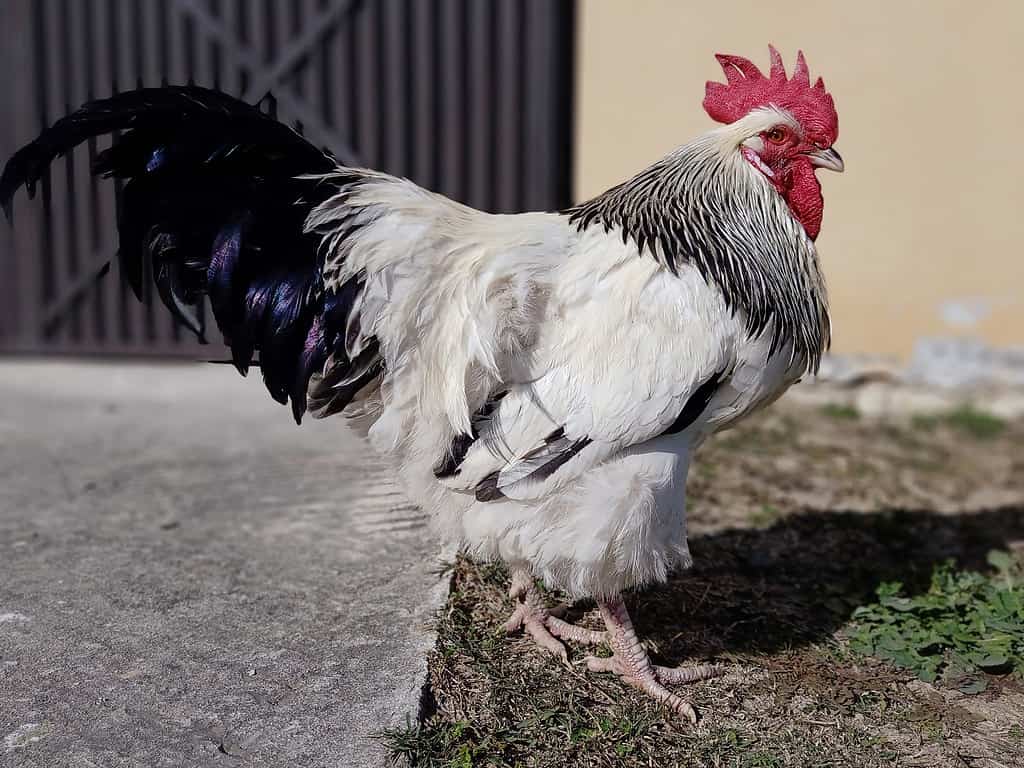
Sussex chickens come in a variety of colors including light, red, speckled, and more.
©Zeeshan Naveed/iStock via Getty Images
Sussex Chicken Maturation and Lifespan
Sussex chickens reach maturity before a lot of other chicken breeds. They usually take about 20 weeks before they start laying eggs. They live for up to 8 years, normally, with slightly longer lifespans if the given bird is exceptionally hardy and well-cared for.
Sussex Chicken Temperament and Behavior
This confident, yet docile breed of chicken likes to be around humans and other hens. They’re generally friendly, out-doing, nonaggressive, independent, curious, and generally calm. They make for excellent pets and do well around other animals, children, and adult humans alike.
Generally, their one “issue” is that they may be too docile, meaning they could be bullied by other birds.
How Noisy are Sussex Chickens?
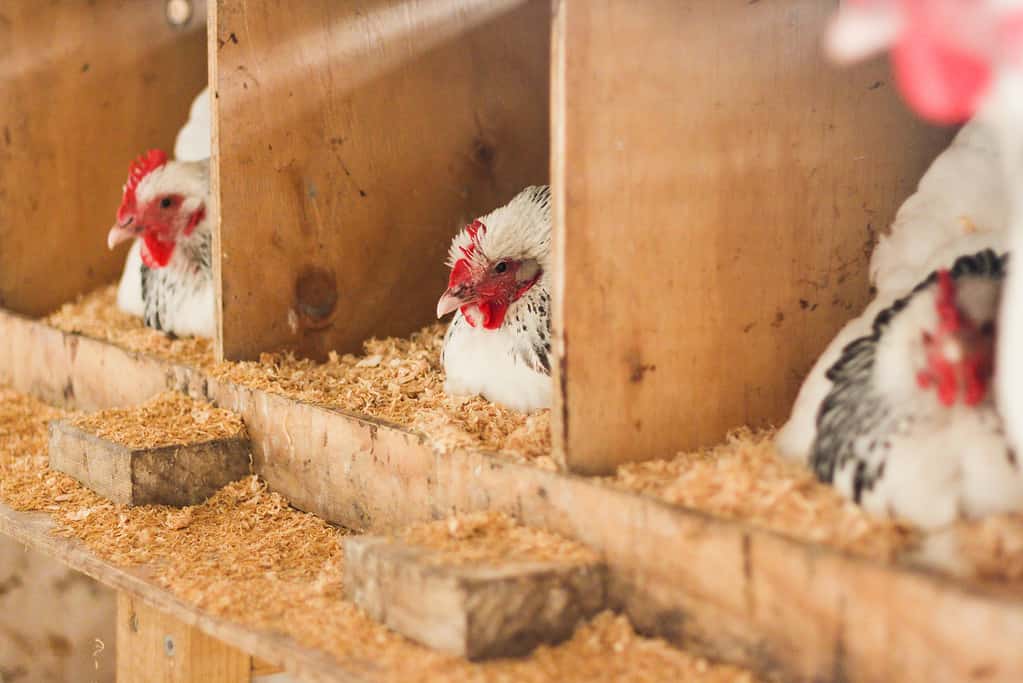
Sussex chickens tend to be broody. So, if you want more chicks, be sure to find a
rooster
.
©iStock.com/nedjelly
This breed is not, thankfully, particularly known as noisy. They can chatter a bit, like all chickens might, while out foraging. But generally, they just sing their egg songs or sound alarms to others in the flock when they feel threatened.
Are Sussex Chickens Good for Kids?
Sussex chickens have high energy, curious, and friendly natures. They’re gentle, rarely aggressive (except roosters who may well be!), and like hanging out with people. Because of these qualities, in most cases, Sussex chickens are perfect for keeping around kids.
Sussex Chicken Health Concerns
Generally healthy, Sussex chickens are considered vigorous and hardy and rarely need special medical care. They will, however, wind up with the usual parasites of worms, mites, or lice, so they need regular check-ups and treatment accordingly. Roosters have large combs, so in winter, rubbing a little petroleum jelly on wattled and combs will help prevent frostbite and cracking.
Sussex Chicken Ease of Care
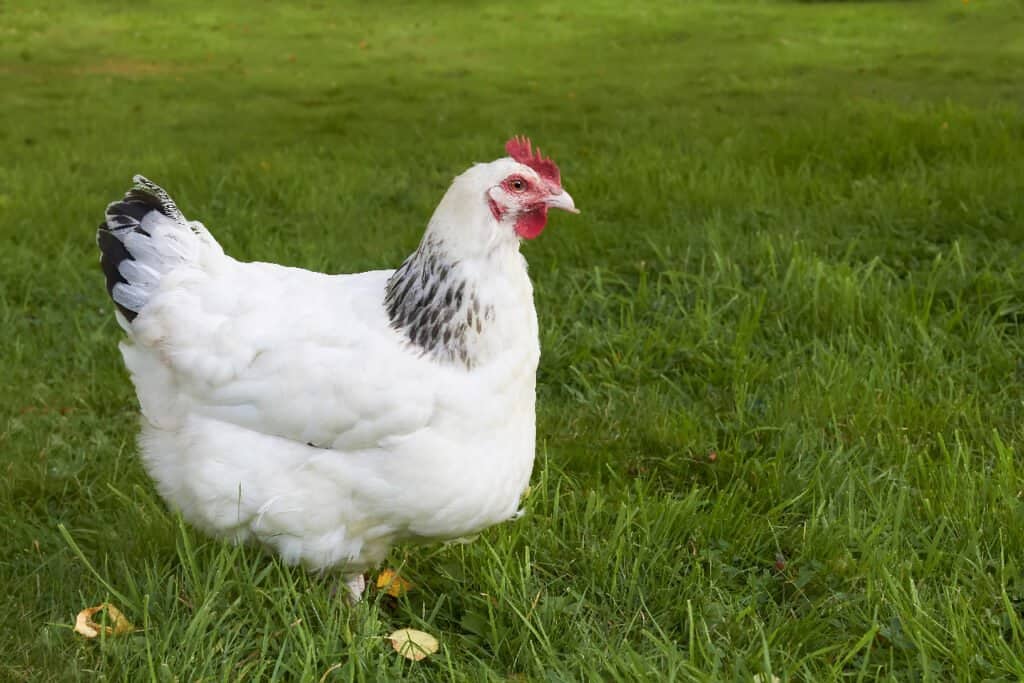
Sussex Chickens come in many colors, including this beautiful Light Sussex coloration of white with black accents.
©Erwin Bosman/Shutterstock.com
This breed of chicken is, thankfully, a low maintenance bird. This may be part of why they are so popular as pets and egg layers. They generally just need food once daily, free ranging options for foraging, plenty of water kept clean, and secure shelter. They’re largely considered the perfect beginner breed.
Feeding Schedules and Amounts
Sussex chickens usually eat about a quarter pound of food each day, which is healthy for them. If left on their own, some of them will overfeed, so it’s important to watch the amounts given. Ideally, let them forage whenever possible. This will help them regulate their intake while you also save some money on their feed.
Standard feed should run at the 16% feed, but during molting season, offer them 18% to 20% feed. You’ll also want to provide them with oyster shell on the regular. Generally, speaking, each chicken will cost you between $0.20 and $0.50 per day to raise.
Do Sussex Chickens Get Along Well with Each Other?
These beautiful birds do, in fact, get along with each other. They also get along well with many other breeds of chicken, as long as the other breeds aren’t particularly aggressive. Sussex chickens tend to be docile, so they don’t do well with large or aggressive breeds.
Sussex Chicken Coop Setup
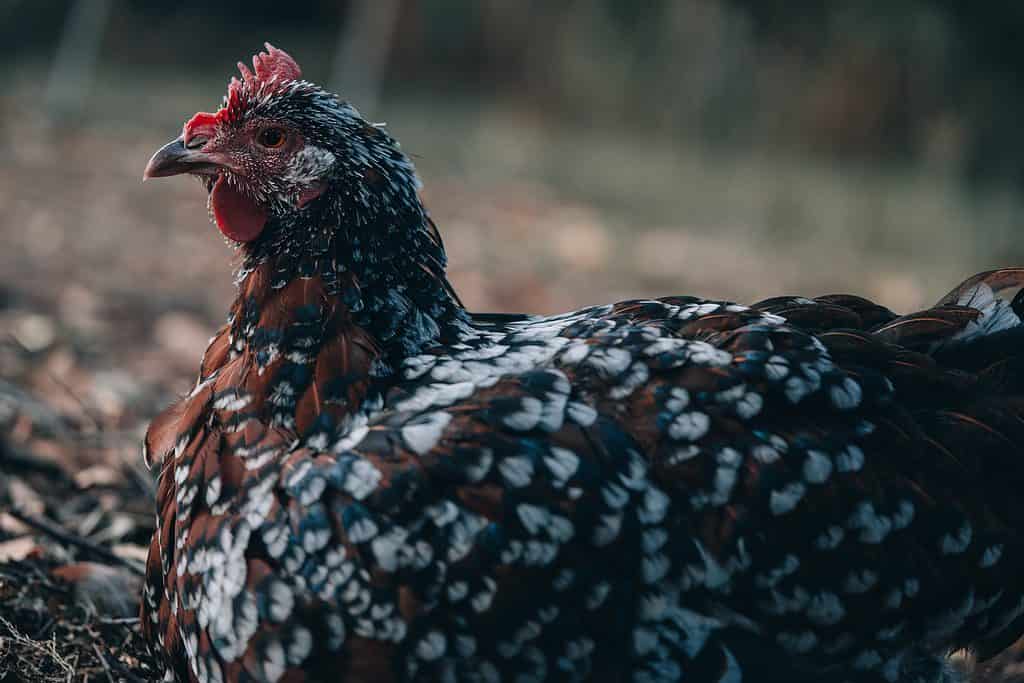
Sussex chicken costs include everything from the basic set up to purchase of the birds themselves. Then, it’s mostly just maintaining proper feed and care for pennies a day.
©Adeline Weyland/Shutterstock.com
One of the biggest expenses for your Sussex chickens runs in the coop setup. If you have an existing coop, you’ll just need to update, but if you’re starting from scratch, you’ll need the following.
- Roosting bars indoors and outdoors
- Insulation to keep the chicken house warm
- Nesting boxes
- Lighting
- Warmers for cold weather
- Proper ventilation
- Dust or dirt areas for dust baths (these help them stay healthy)
If you build the coop yourself, you’ll save heaps of money. Consider seeking out wood to reclaim or scanning the freebie websites for things to use as nesting boxes, lighting, and insulation. A small setup from scratch will likely cost between $300 and $400, while a larger from-scratch setup could run you as much as $2,000.
Pros and Cons of Owning Sussex Chickens
Like with any pet or family flock, raising Sussex chickens has both advantages and disadvantages.
Pros of Owning Sussex Chickens
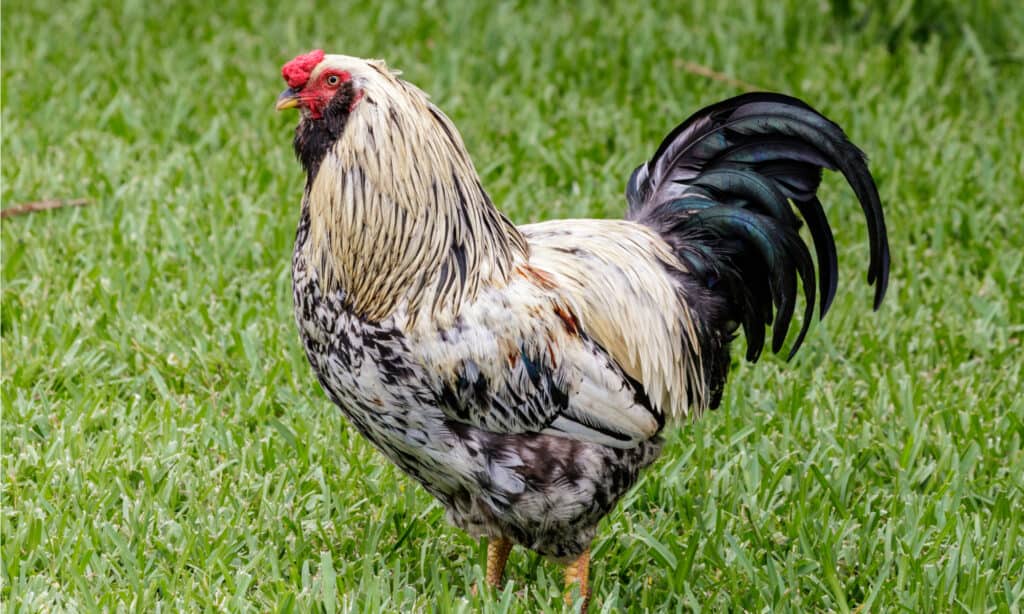
If you wind up with a Sussex rooster, you could raise your own chicks. That means more eggs!
©Microfile.org/Shutterstock.com
- Sussex chickens lay as many as 250 eggs each year! That means with a flock of just five, you could have more than 1,000 eggs each year.
- They begin laying eggs at just 20 weeks old and continually lay for 3 to 4 years.
- These birds make excellent chickens for food, too, if the time comes when you’re ready to say farewell to a bird.
- Sussex chickens tend to be cold-hardy, as well, so can handle frigid temperatures and snow. Just keep them warm enough on the coldest days to help them thrive.
- They make excellent mother chickens. They’re broody, so if you want more chickens, get a rooster and you’ll soon have some chicks.
- They forage for themselves very well. This means you can save some money on food by allowing them to roam.
- Sussex chickens are surprisingly capable of escaping hawks and some other predators. This means you’ll likely keep them around longer than other breeds.
- Come in a wide array of colors and patterns, these beauties simply add to the overall aesthetic of your home.
- They’re friendly and make good pets, too, not just laying hens!
Cons Of Owing Sussex Chickens
Of course, there are some downsides, too, in owning Sussex chickens.
- You have to keep a solid cover on the coop or these birds will escape!
- They have beautifully colored eggs, but they’re often elongated or wonkily shaped.
- Sussex hens tend to be broody, so if you don’t want more chickens around, they will lay on their eggs instead of giving them up for your dinner.
- This particular chicken breed may be healthy, but they’re also prone to obesity if overfed at all. Because they also forage, it’s best to keep the diet in control to avoid overweight birds.
- They’re not the loudest chickens out there, but Sussex chickens definitely get a bit loud and chatty if you have a flock in suburban and urban areas.
- And if your particular birds are especially independent (as many are), they won’t wind up making the best pets after all. Instead, they’ll go off on their own and skip receiving your affections.
Sussex Chicken Eggs
These amazing chickens produce upward of 2,000 eggs in their short lifetimes! This means folks favor them as egg layers in many cases.
- Eggs come in large sizes in light brown coloring.
- They often start laying around 20 weeks to 8 months of age.
- They lay their eggs year-round.
The photo featured at the top of this post is © Erwin Bosman/Shutterstock.com
Thank you for reading! Have some feedback for us? Contact the AZ Animals editorial team.







